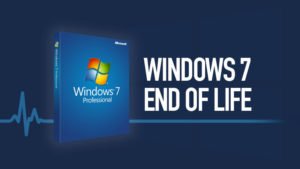
As many of you are likely aware, Microsoft has announced that Windows 7 and Windows Server 2008/R2 will be EOL on January 14, 2020. This of course has created a level of concern for many academic institutions that have not had the opportunity to upgrade their systems to newer, supported versions. At ScholarBuys, we have been fielding an array of questions around this announcement and I wanted to share some great information on what this means for impacted institutions, and what your options are for procuring Extended Security Update (ESU) licensing.
 First, I think it important to note Microsoft’s Lifecycle Policy. This offers 10 years of support (5 years for Mainstream Support and 5 years for Extended Support) for business and developer products such as versions of Windows prior to Windows 10. As per the policy, after the end of the Extended Support period there will no longer be patches or security updates. This can of course cause security and compliance issues and expose organizations to serious security risks in their environments. Microsoft recommends that institutions upgrade to the latest version (Windows 10 / Windows Server 2019) to help reduce security risks and to continue to receive regular security updates for your operating systems. That said, here at ScholarBuys we understand that this is not always feasible for every institution for a variety of reasons. The good news – there are options to extend support and security updates!
First, I think it important to note Microsoft’s Lifecycle Policy. This offers 10 years of support (5 years for Mainstream Support and 5 years for Extended Support) for business and developer products such as versions of Windows prior to Windows 10. As per the policy, after the end of the Extended Support period there will no longer be patches or security updates. This can of course cause security and compliance issues and expose organizations to serious security risks in their environments. Microsoft recommends that institutions upgrade to the latest version (Windows 10 / Windows Server 2019) to help reduce security risks and to continue to receive regular security updates for your operating systems. That said, here at ScholarBuys we understand that this is not always feasible for every institution for a variety of reasons. The good news – there are options to extend support and security updates!
For institutions that are unable to transition to newer versions before the end of support deadline, there are a few options available:
- Virtualization (Desktop) – Windows Virtual Desktop is the only cloud-based service that delivers a multi-user Windows 10 experience. This is optimized for Office 365 Pro Plus, and includes free Windows 7 ESU entitlements.
- Purchase Extended Security Updates (ESU) to protect on-premises servers and desktops. These licenses include security updates for critical and important issues as defined by the Microsoft Security and Response Center. Upon procuring Windows ESU, your school will be provided with a Multiple Activation Key (MAK) which can be used to deploy to the licensed devices. This MAK is independent of the Windows 7 activation and can work in parallel with a Key Management Service (KMS) activation deployment.
Availability: Windows ESU licensing is available for Microsoft customers with an Enterprise License Agreement (EES – Enrollment for Education Solutions) and provides coverage from January 2020 – January 2021. For academic customers that do not qualify for an EES Agreement, they only other option would be to procure them through the CSP program.
Licensing Options:
For Windows 7 ESU, the licensing is actually quite simple for a change. You simply purchase ESU licensing for the total number of Windows 7 devices that you wish to continue to support. If procured through your EES Agreement, these ESU entitlements will actually run their own coverage period completely separate of your term dates for your Enterprise Agreement. Regardless of when you purchase, the order backdates coverage to January 2020 and ends in January 2021. At that time (if still necessary) you would order another batch of ESU licenses for the following year. Please note: my understanding is that the cost increases year over year. If you allocate budget to a purchase this year and expect the need for multi-year coverage, you will want to ensure that you plan for increased costs in each subsequent year (maximum of 3 years before true EOL).
For Windows Server 2008/R2 ESU, the licensing will actually mirror that of your current core-based licensing for Windows Server. You would license the physical host servers in your environment based on their compute capacity:
- Must license all cores across all processors
- Minimum requirement to cover 8 cores per CPU, and at least 2 CPU per host
To cover your Windows Server VMs, you will want to ensure that you are licensing the physical host server with the appropriate Windows Server license edition:
- Windows Server Standard – cover the host and up to two Windows Server OSE’s spun up from that host
- WIndows Server Datacenter – covers the host and provides coverage for unlimited Windows Server OSE’s being spun up on that host
**ScholarBuys generally recommends that you leverage Windows Server Datacenter licensing for your virtualization hosts, and Standard for your standalone physical servers.**
Learn More about Windows and Extended Security Update Options:
The team at ScholarBuys has a wealth of knowledge on Microsoft licensing for academic institutions and we are here to help! If you have any questions on Extended Security Update licensing for your institution, or need assistance with procurement, please feel free to reach out to the ScholarBuys team. We also specialize in reviewing Microsoft licensing in the EDU space, and if you would find value in having a more sound understanding of your current investments in Microsoft technologies and making the most of the ancillary benefits, we would be more than happy to coordinate a review with your team.

